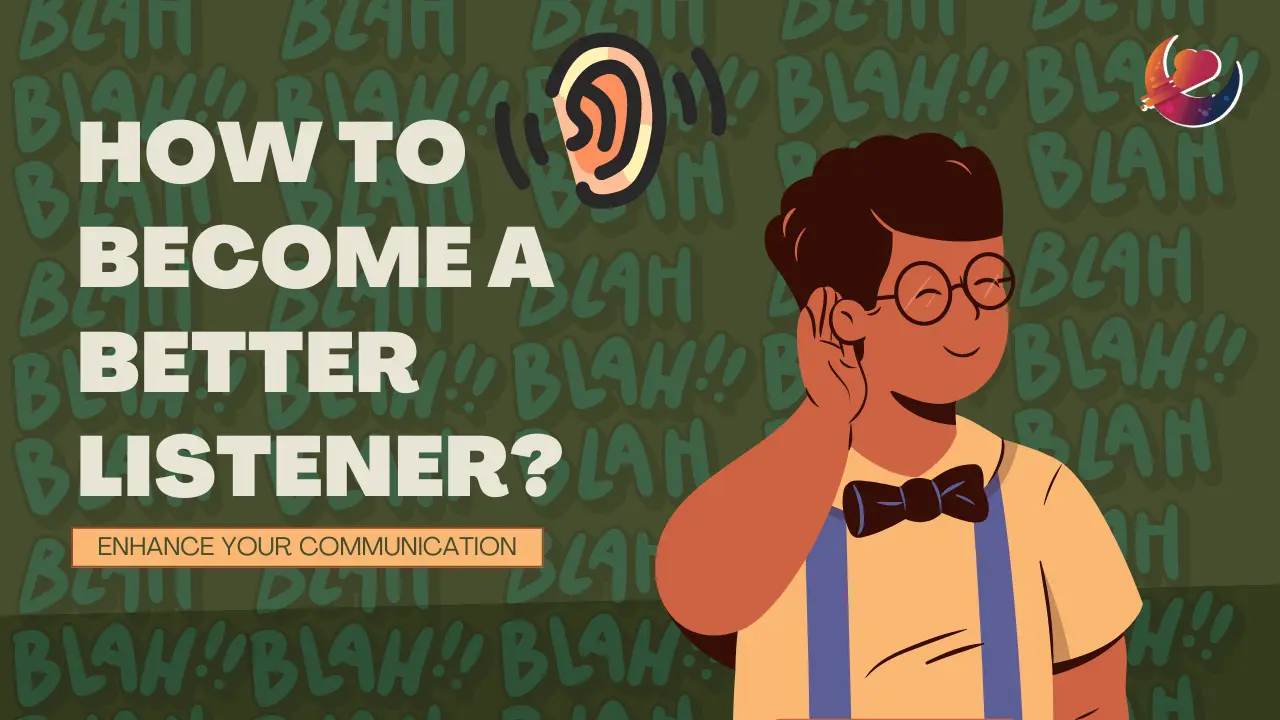By Varsha Ravivenkatesh | 20th June, 2023
Discover the key to becoming a good listener and enhancing your communication skills. Learn valuable techniques such as letting others complete their sentences, showing engagement through body language, asking thoughtful questions, and avoiding common pitfalls. By embracing the power of listening, you can strengthen relationships and foster deeper connections with those around you. Improve your listening skills today with these expert tips!

In a world where people try to constantly share their ideas and opinions, we often need to remember an important skill: Listening. It's an essential skill that is often overlooked by many. Through listening, you can understand people better, become more open-minded and be better informed on the world's happenings. You've also probably heard everyone say that the key to being a good friend or member of society is learning to be a good listener. But no one tells you how exactly to be a good listener. So, here are some tips to excel at listening:
1. Let Them Complete Their Sentences Before You Ask Questions:
When your friend or a classmate starts talking or narrating a story, let them get to the end of the story before you ask your questions, as most of the time, all your doubts will be cleared by the end. Interrupting them in the middle of their narration can irritate people and give the impression that you are impatient and uninterested in what the other person says. So wait and be patient till they finish what they have to say.
2.Make Acknowledgements That You Are Listening Without Interrupting Their Flow.
When listening to someone's story, show that you are engaged using your body language. This can be maintaining eye contact, nodding your head or little gasps at the correct times. This can show that you are invested and encourage them to continue sharing their thoughts. However, ensure your audible reactions don't last long to not distract them from their narration.
3. Make Sure Your Questions Are Well Thought Out:
When asking questions, make sure they are not hurtful or judgemental. When people trust you by telling you sensitive information, empathy and understanding are essential. So, asking insensitive questions may give them the impression that they cannot fully trust you or that you are rude.
4. Don'T Immediately Give Your Input Without Them Asking:
It is human nature to rebuke arguments or offer input all the time. However, people sometimes want someone who'll listen and empathise with them. Not everyone is looking for advice, even if it may be excellent. Also, it shows that you resonate with them as if someone is already irritated; offering unsolicited advice could make them more on edge.
5. Be Focused
Don't fidget with other things like your phone or AirPods; give your full attention to the person talking. This shows that you genuinely care about what they say, and they mean something to you. Though giving complete attention may be challenging, this boosts your listening skills.
6. Don'T Be Quick To Jump To Conclusions Or Be Narrow-Minded:
Carefully consider what they are saying before you form your conclusions. As this person is completely opening their heart to you, showing that you are not judgy can portray you as a good listener and a reliable friend. And make them think they can trust you with whatever information. Also, being open-minded can show that you are intelligent as you are willing to listen to what they say even when you disagree with their opinion.
7. Don'T Prepare What You Are Going To Say While They Are Talking:
When our friend comes up to us with new information, we usually form how we will reply in our heads while they tell us, as it is human nature. But try to be in the moment and listen to them. After they finish, you can take some time and carefully consider how you want to respond. This shows you genuinely care about them and know the effect of your words. And also, taking more time can improve how you answer and provide a more empathetic answer.
8. Don'T Try To Make Your Problems Bigger:
That person who thinks their life is way more complicated than everyone else. And always tries to make your problems seem minuscule. Well, don't be that person and don't try to make everything about you. There's a fine line between agreeing that certain things affect you and making the entire conversation about your problems. So, while they open their heart, show that you care and can relate but don't try to shift the conversation in your direction.
Conclusion:
Overall, being a good listener means you are willing to give your time to a person and listen to whatever they say. If you do that, you are automatically a good listener. So hopefully, these tips will help you become a better listener if you aren't one already.
Thumbnail Design by Mudit Jha






Forgot password?
Close message
Subscribe to this blog post's comments through...
Subscribe via email
SubscribeComments
Post a new comment
Comment as a Guest, or login:
Connected as (Logout)
Not displayed publicly.
Comments by IntenseDebate
Reply as a Guest, or login:
Connected as (Logout)
Not displayed publicly.